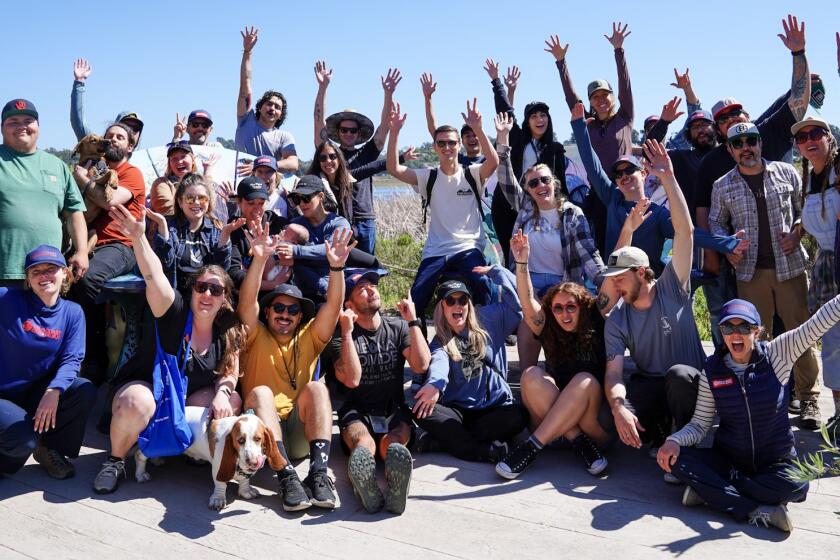Graduating to a four-year degree
California community colleges are exploring the idea of offering baccalaureate degrees to better address workforce needs. Such programs already exist in 22 states across the country, where degrees are offered in select career technical (vocational) education fields such as nursing, software engineering and public safety administration. The U-T San Diego Editorial Board recently met with Constance Carroll, San Diego Community College District Chancellor, and state Sen. Marty Block to discuss the issue. The following is an excerpt of that interview.
Q: There was a working group in the Chancellor’s Office that you were a part of, and you’ve come up with some recommendations that could significantly change the landscape of education in California. Tell us about the proposal.
CARROLL: The California Community Colleges Baccalaureate Study Group has been meeting since the summer. We will have our final report that will be public at the end of November. There are members of the group, and I am one of them, who feel very strongly and enthusiastically about the option we are pursuing to allow community colleges to offer the baccalaureate degree in certain workforce-oriented programs for the purpose of addressing workforce shortages and economic needs in California. The other hat I wear is I’m a member of the board of the National League for Innovation in the Community College, which is an organization of the 18 top-performing community college organizations in the state. And we are pleased that our board and our district is part of the group.
Q: Tell us about the narrow focus. I know everybody’s mentioned nursing. But what other programs might be involved?
CARROLL: The narrow focus is to restrict these degrees to what we call the career technical fields. The term used to be vocational education. What this is about is not turning community colleges into four-year baccalaureate degree-granting institutions, but to allow them to keep their existing mission, the two-year mission, and add to that selected programs in areas where there are shortages and also where there’s a lack of capacity at the university level. Nursing is one area, but there are other programs in allied health, radiologic technology, physical therapy. There are programs in other areas — administration of justice is often one of the programs that you would find. You will find a range of programs in information technology as community colleges ramp up to provide more people trained in those fields. In some states you will find community colleges offering the bachelor’s degree in teacher education. That probably would not be appropriate in California because California teacher education is structured differently. So this is about, again, workforce training and where universities lack capacity.
Q: What is the process? What’s the timing?
BLOCK: I’ve already carried two pieces of legislation supporting this and the timing, admittedly, wasn’t good. This is back when we had budget deficits and the Legislature wasn’t about to fund new programs, innovative programs, no matter how good they might be because we were having a hard time just retaining current programs. Now that we’ve finally seen a bit of a turnaround in the economy and we have the wherewithal to do it, and now that we could do this without really adding more cost to the system, I think the legislature’s ready to move forward and I’m definitely going to move forward with a bill this session, probably introducing it in January.
Q: Tell us how this can happen without increasing cost.
CARROLL: I’ll give you an example. Two years ago, when we opened a new building at City College, we doubled the size of their nursing program. And that is probably far more costly to do because the first two years of the nursing program are clinical years. That’s where community colleges incur the high cost. But we doubled the size of the program because of the shortage of RNs and we did not receive an additional state appropriation in order to do that. This is just a choice that we made within our budget. Community colleges make these choices all the time to diminish some programs that are not doing well in order to expand others that are. And so that would be one. The second is the experience that other states have had indicates that the student tuition or student enrollment fee for programs at the baccalaureate level would be higher. In Miami, for example, the costs are not as high as what the universities charge for the baccalaureate, but not as low as the associate degree charges, so within a span of time — with the student contribution and the additional enrollment that would be generated — the program can become self-sufficient. It’s not a matter of needing a giant infusion of cash in order to do something. It’s a matter of how we manage the program financially.
Q: What are the political obstacles to doing this, both in the legislature and from other sources? I would assume that the California State University (CSU) and University of California (UC) systems will probably oppose this.
BLOCK: Well, the last time I (ran) this bill the CSU and UC systems didn’t really care a whole lot about it. They’re fairly agnostic. Most of these programs are not things that are going to in anyway diminish demand at UC. For the CSUs, what I’m going to propose this year is that the local CSU be part of a team, along with workforce development people and the community college, so it’s three entities, deciding what should be offered. And the community college wouldn’t offer a class that the CSU wants to offer and the CSU feels it has the capacity to offer, and that the CSU feels might harm them.
I don’t think the CSUs would be antagonistic to this. Last time I ran the bill they did not take an official position. And that was because only a few years before that Constance and I and several others went up to Sacramento to lobby for an Ed.D, a doctoral degree for the California State University. At that time the UC said, well, wait. They don’t want the CSU to jump into our space. But the CSU said, Look. You’re not offering Ed.Ds, and we have the capacity to do it. There’s demand so let’s do it. So for the CSU now to say those arguments we were making a few years ago are not valid would be more than hypocritical.
CARROLL: The biggest misconception is that this is about trying to turn community colleges into four-year institutions, which it is not. We want to keep our two-year mission. If you focus on the nursing issue, for example, what has happened in the field is that the field itself is migrating to a baccalaureate requirement to be an RN. If that were not the case then probably this would not be of great concern to us. But you have hospitals that are magnet hospitals like Sharp.
And if you look at their (job) announcements for registered nurses they will say bachelor’s degree preferred, and the whole profession is moving in that direction. So at some point the associate degree level will be obsolete. What happens then? Seventy-two programs with associate degrees, and not enough capacity at the baccalaureate level to pick up the slack. That, really, is what our concern is. And so making sure that we have, as Marty says, a regional group to take a look at the workforce needs, the university capacity and the community college readiness is a great way to go. But the driving force is the workforce. The driving force is what does California need? What does San Diego need in terms of trained people for jobs, basically? And that’s what all of this is about.
Q: Would the baccalaureate program be available to all community colleges or would it be restricted to certain districts?
BLOCK: We’re waiting to see what the recommendations are out of the Chancellor’s Task Force. It may well be just a pilot program to start with. My previous bill I think had Grossmont, Cuyamaca and San Diego and San Mateo piloting a program at first where each offers one bachelor’s degree. Or it may be more ambitious than that. I want to be as ambitious as we think we can get.
CARROLL: Up and down the state the community colleges are very, very supportive. Trustees are supportive. There’ll be some who will not be. But then they wouldn’t have to implement it. This is the first time, officially, that the state has decided to undertake a review. In the past it was just idle discussion. I’m very pleased that our system office is the one that says it’s time to take this seriously.
Q: What have we not asked you about the baccalaureate issue that you think is important for people to know?
CARROLL: I would want people to know how well it works in Florida, for example, and what is different there than here. And not every community college in Florida offers the baccalaureate degree. They have worked out a system for which ones do and which ones don’t and what disciplines they offer. They also have a good accountability model to assess how effective those degrees are. And they make that public as well. So in this and other cases I think it’s high time that California learned from other states. California sometimes thinks that it’s in the lead, and it’s not, in higher education.
And we would like to see it join the upper echelons of innovative community colleges and higher educational systems. And one of the ways to do this is to make sure that we tailor our programs to our highest priorities. And in this case the highest priority is workforce education.
BLOCK: And producing more bachelors degrees. I think we need to instill a sense of urgency in folks. The Hoover Commission just came out with a study very critical of how we’re not producing enough well-trained folks. It’s a problem that needs answers.
Get Weekend Opinion on Sundays and Reader Opinion on Mondays
Editorials, commentary and more delivered Sunday morning, and Reader Reaction on Mondays.
You may occasionally receive promotional content from the San Diego Union-Tribune.





